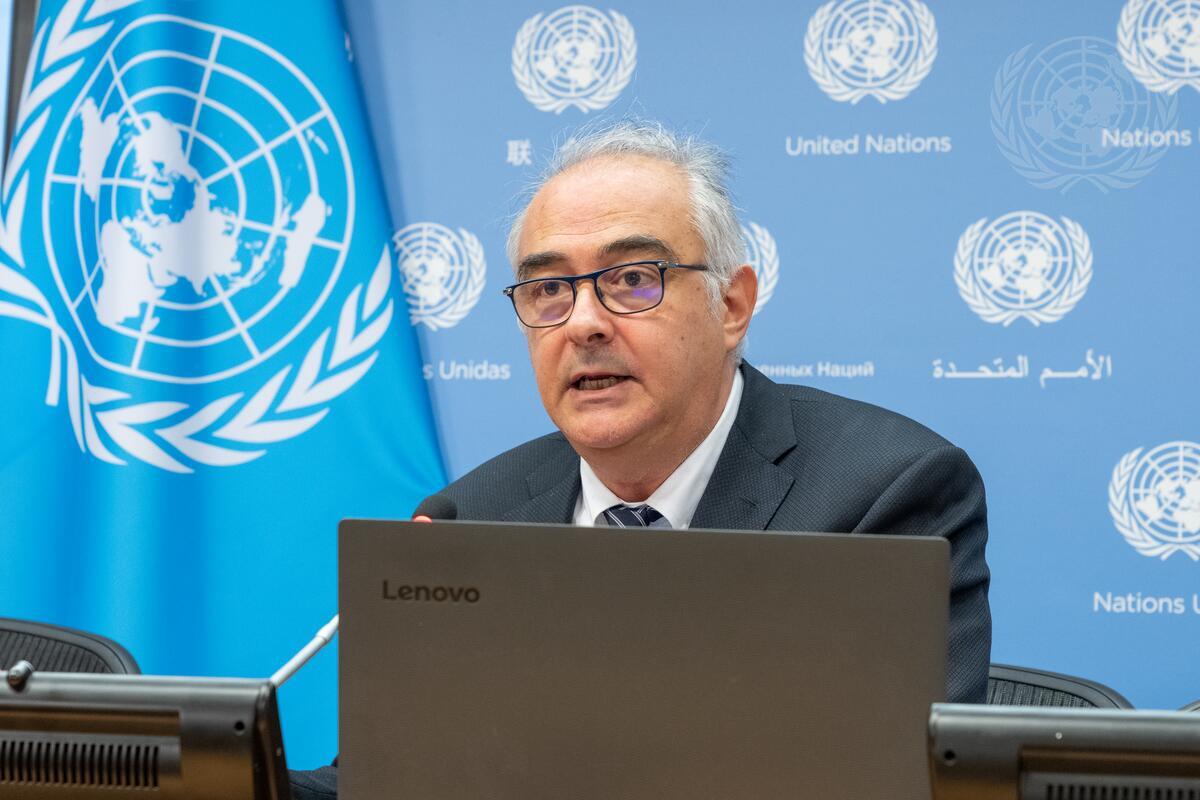ASTANA — Kazakhstan, a frontrunner in digital transformation, is no longer just adopting the world’s best practices—it is emerging as an enabler, said Vincenzo Aquaro, chief of the Digital Government Branch at the United Nations Department of Economic and Social Affairs (UNDESA), in an interview with The Astana Times.

Vincenzo Aquaro, the chief of the Digital Government Branch at the United Nations Department of Economic and Social Affairs (UNDESA). Photo credit: UN Photo/Cia Pak
Pioneer in digital governance
“Rather than simply adopting strategies from advanced digital nations, Kazakhstan seeks to facilitate an open and transparent dialogue with peer leaders. This approach strengthens the country’s position as a global leader in digital governance and AI-driven economic growth, reinforcing its commitment to responsible, inclusive and future-oriented technological development,” said Aquaro.
The 2024 UN E-Government Survey identified six key drivers for successful digital governance. This includes digital leadership and policy support, collaboration, data-centricity and regulatory frameworks, digital identification systems, robust digital infrastructure, and effective e-government services.
According to him, Kazakhstan has integrated these principles and should continue strengthening them to sustain progress.
“Kazakhstan has been a pioneer in digital governance, appointing chief information officers (CIOs) as vice ministers and establishing a coordination board to streamline implementation across sectors. Additionally, it has established a coordination board to harmonize digital government implementation across sectors. These efforts reflect strong political commitment and policy support, positioning Kazakhstan as a leader in digital transformation,” said Aquaro.
According to the UN survey, Kazakhstan is a leading country among the Landlocked Developing Countries (LLDCs) and one of the top performers in the Eurasian Economic Union (EAEU).
“To further strengthen its regional leadership in digital governance, Kazakhstan should build on this momentum by aligning its investments and policies with key priorities outlined in the UN Secretary-General’s Pact for the Future, particularly within the Global Digital Compact,” said Aquaro.
Kazakhstan’s digital evolution is reflected in its collaboration efforts. The country draws on expertise from other nations and international organizations such as UNDESA and the UN’s Economic and Social Commission for Asia and the Pacific.
Aquaro noted that ongoing investments in information and communication technologies (ICT) infrastructure – ranging from broadband expansion to digital public platforms – are reinforcing Kazakhstan’s position as a leader in digital transformation.
“Kazakhstan has made significant progress in providing seamless online government services, ensuring accessibility and efficiency while promoting citizen participation in decision-making processes,” he said.
“By maintaining momentum in these areas, Kazakhstan is well-positioned to remain a regional leader in digital governance, setting a benchmark for other nations striving for a more inclusive, efficient and technology-driven public sector,” he added.
Bridging the digital transformation gap
Countries worldwide, including Kazakhstan, face the challenge of ensuring that digital transformation reaches all citizens, not just the urban population.
UN experts highlight that policymakers should first acknowledge an increased risk faced by those excluded from digital transformation. They need to take proactive measures to ensure meaningful digital inclusion while safeguarding individual rights and privacy.
To close this gap, Aquaro emphasized that Kazakhstan can implement “inclusion by design” before “digital by design.”
Tailored digital services for vulnerable groups, satellite broadband expansion, public-private partnerships for last-mile connectivity, and enhanced digital literacy programs are essential to closing the urban-rural divide.
“Given that deploying fiber-optic networks in remote areas may not be financially viable for private sector investment, Kazakhstan should prioritize satellite broadband solutions to ensure nationwide coverage. This will provide rural communities with reliable internet access, enabling them to benefit from online education, telemedicine and e-government services,” said Aquaro.
“By using digital government as a tool for equal opportunity, investing in nationwide connectivity, and ensuring inclusive service design, Kazakhstan can create a digitally empowered society where no one—regardless of geography or socioeconomic status—is left behind in its digital transformation journey,” he added.
Digital security, transparency and accessibility
Strengthening digital security while maintaining accessibility requires a balanced approach. Achieving this goal demands enhancing the cybersecurity framework, upholding transparency in digital governance, integrating “privacy-by-design” principles, and promoting public awareness of data protection.
“Leveraging artificial intelligence and big data analytics can help predict and mitigate cyber risks. Automated threat detection and real-time monitoring will allow Kazakhstan to proactively address security challenges without disrupting accessibility,” said Aquaro.
AI in digital governance
When asked how AI and automation will influence digital government, Aquaro noted that these technologies are set to revolutionize governance. Kazakhstan is embracing this shift through strategic investments and global collaboration. He cited Kazakh Prime Minister Olzhas Bektenov, who highlighted this approach in his opening speech at the Digital Almaty Forum on Jan. 31.
Bektenov identified three key aspects of AI expansion. This includes human capital development, digital infrastructure, and institutional frameworks. He noted a global shift from competition to cooperation in AI research, with leading tech companies joining forces to advance innovation.
“By leveraging AI and automation responsibly, Kazakhstan can set a global example in ethical digital governance, enhance public service efficiency, and drive inclusive economic growth while safeguarding national digital sovereignty,” said Aquaro.
Challenges and opportunities
A key challenge for Kazakhstan is ensuring AI governance and ethical integrity while balancing innovation with transparency, fairness and security. Addressing data privacy, misinformation, and cybersecurity issues will be critical to maintaining public trust.
“Despite these challenges, Kazakhstan sees immense opportunities in the AI era, as clearly addressed by all the speakers at the Almaty digital forum. By fostering international cooperation and multilateralism, the country is positioning itself as a regional hub for AI innovation, supporting startups, SMEs and research institutions to accelerate technological progress,” said Aquaro.
Kazakhstan is also committed to reducing its dependence on foreign AI models by building national data centers and developing a sovereign large language model (LLM), ensuring greater control over its digital future.
Aquaro noted that Kazakhstan recognizes both the risks and opportunities of AI, balancing concerns over governance, security, and ethics with its potential to drive economic growth and technological advancement.
